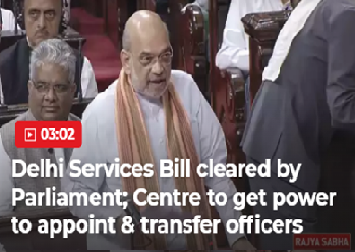Here are the key points about the Delhi Services Bill:
- Introduction and Purpose:
- The Delhi Services Bill, officially known as the Government of National Capital Territory of Delhi (Amendment) Bill 2023, is currently being presented in the Indian Parliament.
- Replaces an Ordinance:
- This bill is designed to replace an existing ordinance that overrides a directive from the Supreme Court. The directive empowers the Delhi government with authority over most public services in the national capital.
- Background of Contentions:
- The ordinance has been a significant source of disagreement and conflict between the Aam Aadmi Party led by Delhi Chief Minister Arvind Kejriwal and the central government.
- Passage through Parliament:
- The bill successfully passed through both the upper and lower houses of the Indian Parliament on August 7th.
- Awaiting Presidential Approval:
- Once approved by both houses of Parliament, the bill will become law after receiving the signature of India’s President, Draupadi Murmu.
These points provide a concise overview of the Delhi Services Bill, its purpose, legislative progress, and implications for governance in the Indian capital.
What happened so far?
Certainly, Here are the key points regarding the Supreme Court decision, the ordinance, and the subsequent developments:
- Supreme Court Decision (May 11):
- The Supreme Court of India ruled in favor of the Delhi government, granting it comprehensive control over most services in the capital. Excluded from this authority were public order, land, and police.
- Ordinance Issued (May 19):
- In response to the Supreme Court’s decision, the Centre introduced an ordinance that empowered the Delhi government to offer recommendations to the Delhi Lieutenant Governor concerning matters like transfers, vigilance, and related issues.
- Balancing Local and National Interests:
- The government order highlighted the need for a specialized administrative framework to balance local and national democratic interests, reflecting the aspirations of both the Government of India and the Government of National Capital Territory of Delhi (GNCTD).
- Introduction of Permanent Authority:
- A permanent authority, headed by the Delhi Chief Minister, was proposed to make recommendations to the Lieutenant Governor regarding transfer postings, vigilance, and other related matters.
- Controversy and Criticism:
- The BJP-led Centre faced criticism from the AAP government, which accused it of attempting to undermine law and order and gain control over the capital city’s bureaucracy.
- Passing of Bill in Lok Sabha (August 3):
- Lok Sabha passed the Government of the National Capital Territory of Delhi (Amendment) Bill, 2023, converting the ordinance into law. This bill grants authority to Centre-appointed bureaucrats to overrule the elected Chief Minister and senior officers in the Delhi government.
- Debate in Lok Sabha:
- A nearly four-hour-long debate took place in Lok Sabha before the bill’s passage. Opposition parties staged a walkout during the debate.
- Centre’s Authority over Union Territories:
- Home Minister Amit Shah clarified that the central government has the power to enact laws for Union territories, including Delhi, as it falls under this category.
- Allegations and Response:
- Opposition parties accused the bill of curbing Delhi Assembly’s powers. Amit Shah dismissed these objections as political and lacking a constitutional basis.
These points encapsulate the sequence of events, debates, and viewpoints surrounding the Supreme Court decision, the subsequent ordinance, and the passage of the amendment bill.
What is the new bill all about?
Certainly, Here are the main points regarding the Delhi Services Bill and the related debate:
- Provisions of the Delhi Services Bill:
- The Delhi Services Bill outlines that inquiries and suspensions of officials within the national capital will fall under the jurisdiction of the Centre.
- The Lieutenant Governor will gain authority for sole discretion in various matters, including recommendations from the National Capital Civil Services Authority.
- Intervention by Minister of State Meenakshi Lekhi:
- Meenakshi Lekhi, Minister of State for External Affairs and Culture, highlighted the quasi-federal structure of India, emphasizing the primacy of the Centre.
- She clarified that the bill aims to create statutory equilibrium between the interests of the Union Territory of Delhi and the nation.
- Quasi-Federal Structure Clarification:
- Lekhi affirmed that India possesses a quasi-federal structure as outlined by the Constitution, distinguishing it from a fully federal system.
- She expressed concerns about misleading interpretations by certain practicing lawyers.
- Opposition’s Criticism – Adhir Ranjan Chowdhury:
- Congress leader Adhir Ranjan Chowdhury criticized the bill, asserting that it seeks to unlawfully strip power from an elected government.
- He deemed the act of diminishing the authority of a democratically elected government unconstitutional.
- Kejriwal’s Reaction:
- Delhi Chief Minister Arvind Kejriwal responded strongly to the debate, accusing the BJP of betraying its promise to grant full statehood to Delhi.
- Kejriwal expressed skepticism towards future statements made by Prime Minister Modi.
These points encapsulate the key aspects of the Delhi Services Bill, the parliamentary debate, and the perspectives expressed by various individuals, including Minister Meenakshi Lekhi, Congress leader Adhir Ranjan Chowdhury, and Delhi CM Arvind Kejriwal.

